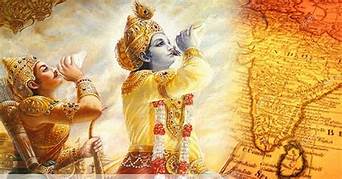Which is greater – Dharma or Rashtra : an exploration


Let’s go back few millenniums: near modern day Delhi, there was a flourishing city called Hastinapura. This was the capital of the Kuru Pradesh or Kuru Kingdom. Kuru was a flourishing state, endowed with riches and prosperity, having a huge army at its disposal, – yet its rulers were obliterated in one of the bloodiest battles of ancient era. There was a Rashtra then but Dharma had shrunk drastically. Result – annihilation!
Let’s look at an extract from the Mahabharata Book V Udyoga Parva where Sri Krishna as the Emissary of Peace went to Hastinapur to make a last attempt to broker peace between the warring factions. When the reigning prince Duryodhana made it clear that he wouldn’t surrender even a piece of land on the tip of a needle without fight, Krishna urged the Kuru veterans thus:

A person may be abandoned for the sake of the family, a family may be sacrificed for the sake of a village, a village may be sacrificed for the sake of a Nation. For the sake of one’s soul the entire world may be forsaken.
But what’s the need to abandon if all was well. Here Krishna’s reference to Kuru King Dhritarashtra to save Kuru Pradesh and his line by giving up on his son Duryadhana who was siding with “Adharma”.
There can be no better example from our itihasha and culture of what happens when Rashtra takes precedence at the expense of Dharma.
There are other examples from itihasha like Lanka of Ravana, Magadha under Dhanananda – all were strong States or Rashtras but sans Dharma. They naturally got replaced over time by Dharmic rulers !
So where does it lead us ?
Let’s look at it through the lens of one of Modern India’s greatest thinker and doer : Swami Vivekananda.
While on his triumphant return from the West, Swamiji conducted whirlwind lectures from Colombo to Almora, and also made some fascinating statements :
Now, based on the above statements and also going by our traditions, we know that in India, lineage is drawn from Rishis who had experiential understanding of Dharma. Since a Rashtra is formed of people, Bharata Rashtra is formed of people drawing lineage from Rishis / people deeply embedded in Dharma.
Spirituality being the life blood of people in India (owing to lineage and karmic action over millenniums), it has to be the backbone and anything else like Society, Politics has to grow around it.
Last but not the least, to prepare Indians for independence where the nation had to connect people to people, the Swami calls upon our Race as the Living God.
To summarize,
I) State or Rashtra is important, but India’s experience shows if Rashtra is alienated from Dharma, that Rashtra doesn’t survive long.
II) Dharma forms the bedrock around which everything else must form, grow owing to the conditioning of millenniums.
III) If India distances itself from Spirituality or Dharma, chances are that the nation may get extinct in a few generations.
IV) So, Rashtra based on Dharma and serving the living God, our Race can be the highest ideal for Indians / Bharatiyas.
In short, Rashtra and Dharma go hand-hand in india : if Rashtra is the sword, then Dharma is it’s Sheath / Scabbard; if Rashtra is the Vijaystambh or Victory Tower then Dharma is it’s bedrock / foundation. It’s not possible to look at Rashtra, distanced from Dharma at least in India. The two are intertwined and inter-related and can’t be separated like milk from it’s colour or sugar from it’s sweetness.
DISCLAIMER: The author is solely responsible for the views expressed in this article. The author carries the responsibility for citing and/or licensing of images utilized within the text.
